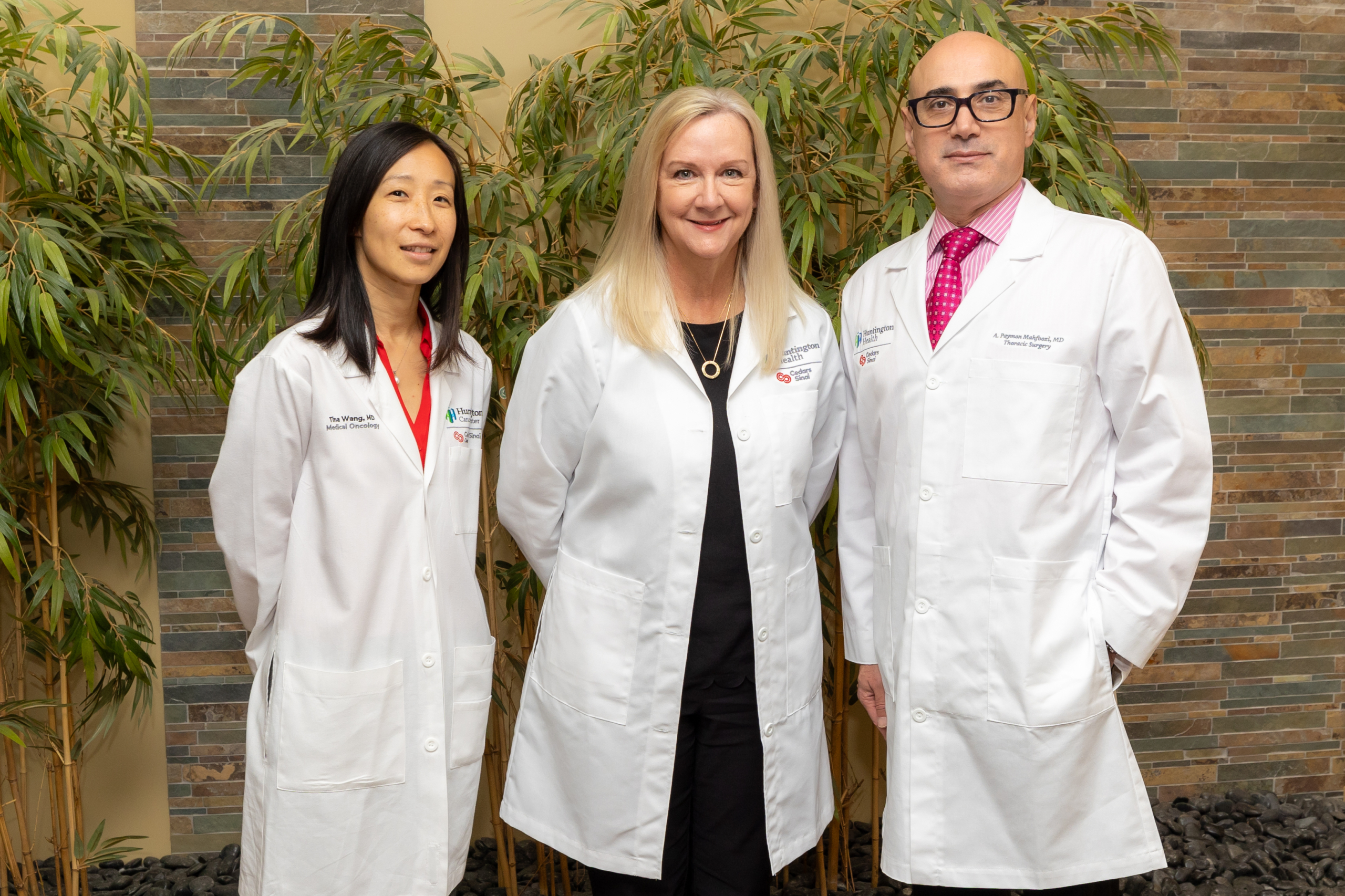Questions & answers from our expert lung cancer team.
Did you know that lung cancer is the leading cause of cancer death in the U.S.? This November, in honor of Lung Cancer Awareness Month, we sat down with members of the team at Huntington Cancer Center, an affiliate of Cedars-Sinai Cancer, that specialize in thoracic cancer, including lung cancer. They offered helpful information on how to catch lung cancer early and how it can be effectively treated. Read on to hear from thoracic surgeon Amirhossein Mahfoozi, MD; Clinical Director of Medical Oncology Tina Wang, MD; and nurse navigator Christine Conti, RN.
When is surgery used to treat lung cancer?
Dr. Mahfoozi: For some patients diagnosed with lung cancer, surgery may be the only treatment needed. When we catch lung cancer early (stage 1), we can operate and remove the tumor. The surgery is often performed in a minimally invasive way using robotic techniques, which can speed up recovery times. When lung cancer is diagnosed at later stages, multimodality therapy is often needed that can include immunotherapy or targeted therapy either before or after surgery.
What other treatments are used for lung cancer?
Dr. Wang: Lung cancer is treated in several different ways, depending on the type of lung cancer and how far it has spread. Before starting treatment, we develop a personalized care plan for every patient. At Huntington Health, we offer immunotherapy, a novel way of treatment that activates the immune system to attack cancer. For some patients, we utilize targeted therapy, a type of precision treatment that uses drugs to attack cancer cells with specific mutations. Chemotherapy is also beneficial for many patients with lung cancer.
What does a nurse navigator do?
Nurse Christine: Our team of nurse navigators helps patients and their caregivers throughout their cancer journey. We are patient advocates. We assess and anticipate their needs, including clinical, emotional, spiritual, financial and other needs. We provide the patient and their caregivers with education about their type of cancer and treatment options, coordinate appointments, communicate with members of the care team, provide referrals for supportive resources and more. We are here to guide patients through one of the most challenging times in their lives.
What is a tumor board and what is the benefit?
Dr. Mahfoozi: We bring together medical experts across multiple disciplines — surgeons, radiation oncologists, medical oncologists, pathologist, radiologists, pulmonologists, and others — to plan and discuss optimal treatment. These meetings — known as tumor boards — help ensure the broadest and best clinical thinking regarding the most up-to-date therapy options for each patient. In addition to specialists from Huntington Health and Cedars-Sinai, tumor boards include specialists from other academic medical institutions. We have specialty tumor boards for lung/thoracic, prostate/genitourinary, neurological, general, and breast cancers. By bringing together leading cancer specialists in the region, these meetings help ensure our patients get highly personalized cancer care.
What should our patients know about lung cancer screening?
Nurse Christine: Early detection truly does save lives.In California, however, only 1% of those eligible, are getting screened, so it is important that we normalize screening. People aged 50 to 80 years old who have a 20-pack-year smoking history (that means one pack a day for 20 years, two packs a day for 10 years, etc.) benefit from annual screening. The screening test for lung cancer only takes a few minutes and is not painful. It is performed using a low-dose computed tomography (also called a low-dose CT scan). Be sure to ask your doctor for a screening referral if you meet these guidelines.
What makes Huntington Cancer Center special?
Dr. Wang: At Huntington Cancer Center, we offer the care patients need, close to home. We have an expert team of dedicated cancer specialists and offer leading-edge treatment options using modern technology. We are also proud to have an unrivaled patient support program. Our support services include our Integrative Oncology program, support groups and more. Through the Constance G. Zahorik Appearance Center, we help patients manage the cosmetic side effects of their cancer treatment. We are very fortunate to be able to offer these above-and-beyond services for our patients.
Visit huntingtonhealth.org/lung to learn more about our lung cancer program.
 English
English Espanol
Espanol 简体中文
简体中文 Tagalog
Tagalog հայերեն
հայերեն 한국인
한국인 Tiếng Việt
Tiếng Việt فارسی
فارسی русский
русский 日本
日本 عربي
عربي